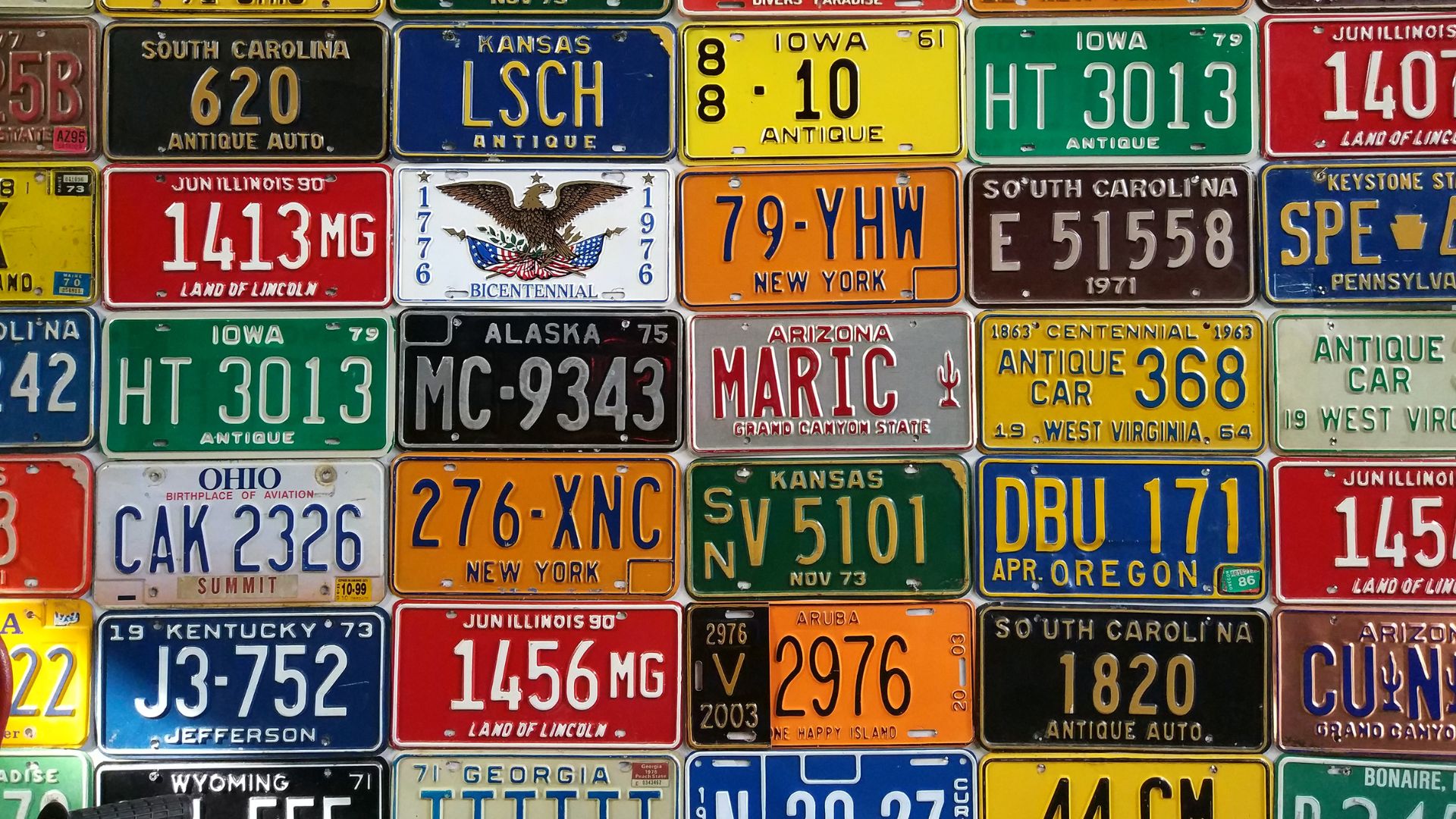Yes, you can. Local and federal governments maintain comprehensive records. They know your name, residential address, vehicle specifications, accident history, etc. They are not the only ones.
If you’ve ever subscribed to a service that recorded your license plate, they know enough to find you. But if you’re lucky, the privacy laws in your region will prevent them from misusing your information. Unfortunately, many drivers are ignorant of their rights. If you’re worried about the information your local DMV holds and whether or not they can disseminate it without your express approval, this is what you should know:
Purpose And Limitations Of License Numbers
A license plate is a metallic or plastic sheet attached to a vehicle. Governments use license plates to identify cars. Every vehicle on the road has a distinct ID that consists of letters and numbers.
In some countries, each sequence of characters has a specific meaning. If you can decipher the number plate, you can trace the car’s origins to a particular area, owner, and year.
But in other places, the license plate number is meaningless. Yes, it identifies the car, but the characters don’t have a particular meaning. Depending on your location, the DMV will attach the plate to the front and back or just the back.
Your plate may also include a special sticker that shows the license plate’s country and state of origin. For instance, New York plates have a marker that anyone can use to trace the vehicle to the city. If you need a license plate for a new car, you have three options:
- Most cars use standard license plates. They have the same design.
- You can pay a fee to customize your license plate. The DMV calls this a vanity license plate. You can write anything you want on the plate.
- Specialized plates apply to individuals with affiliations to specific organizations. For instance, a soldier can add a tag to their plate, allowing other drivers to identify him as a veteran.
You should check your local DMV’s website to get a better sense of the rules that govern license plates in your area. For instance, they will tell you what happens if your vehicle is destroyed. Will they issue you the same license number or create a new one?
Can you transfer your license plate from an old vehicle to a new one? Can you change the color? The DMV can answer all these questions and more.
Exploring The Legal And Ethical Implications Of Using License Numbers To Find Someone
License plate numbers are public information. No one can stop you from recording every license plate you see on the road.
In fact, organizations and individuals alike are constantly innovating new tools and techniques for capturing and deciphering license plate information. This paper from the Transportation Research Board’s Annual Meeting in Washington (1998) explores license plate matching techniques in great detail.
It highlights a method that collects license plates using video cameras and camcorders. While you can collect license plates manually, it is much easier to trust a system that records the license number and transcribes it for the human observer.
But is that legal? Yes, it is. Law enforcement organizations use this technology to catch criminals, which is why they continue to deploy automated license plate readers in various parts of the world.
But what about connecting license plates to people? After all, license plate readers won’t stop at recording the license number. They will search for it in local and federal databases until they identify the person that owns the license plate.
Isn’t that an invasion of privacy? Car-And-Driver spoke to someone from the Electronic Frontier Foundation, who raised a similar concern. They don’t like the idea that license plate reader data can trace target drivers to sensitive locations such as immigration clinics, churches, and gun shops.
The last thing illegal immigrants and abortionists want is for the government to monitor them closely.
However, it should be noted that drivers have more protections than they realize. The Driver’s Privacy Protection Act in the United States is the most important. According to the Texas Department of Motor Vehicles, while a license plate number is public information, the law expects the DMV to protect the personal information it reveals.
In other words, your local DMV can’t reveal your identity or driving history to anyone that asks. Additionally, they are prohibited from publishing that information to the public without your permission.
Canada has similar laws. According to this paper from the Office of the Information and Privacy Commissioner, anyone in Ontario could use your license plate number to find your name and address.
That changed in 1994 when the Ministry of Transportation introduced new rules to protect driver privacy. If you check your local DMV’s website, you might be surprised to discover the many laws the local authorities have enacted to protect your privacy.
You can rest easy knowing that random strangers cannot find your name or address by simply submitting your license plate number to the DMV.
Authorized Access To License Information
Random strangers cannot retrieve your information by submitting your license number plate to the local DMV. However, that doesn’t mean your data is off-limits. There are plenty of exceptions, including the following:
- Technically speaking, strangers can access your driving information if they submit a request. For instance, an individual can ask for your address and identity if you flee the scene of an accident or park in a restricted location. If the reason meets the demands of the law, the DMV will provide the requested information. Every state has its own rules.
- Government agencies can access your records. But in some cases, they need a court order.
- Many law enforcement agencies have access to the DMV’s databases. They can retrieve your information whenever they want.
- A lawyer can request your information to resolve a legal issue.
- Insurance companies and banks can request your information while performing credit and eligibility checks.
- Licensed private investigators can request your records.
Check the DMV’s website to find the complete list of organizations and individuals with access to your records.
Exploring The Availability And Legality Of License Plate Lookup Services, Their Limitations, And Accuracy
You can bypass federal and local privacy laws by using a reverse license plate lookup service. Once you enter the target’s license plate number, the service will scan its database until it identifies the correct driver.
But are these websites legal? Many governments prohibit unauthorized personnel from accessing another driver’s DMV records. This puts lookup services in a gray area. Whether or not they are legal depends on your location.
But where do they get their information? They typically buy it. According to Legal Beagle, the law has provisions that allow individuals and entities with your information to sell it. But that raises another question.
Can you trust the information lookup services provide? No, you can’t. Most search firms are scams working behind the scenes to steal your information. Many of them claim to provide free lookup services.
However, they will either wear you down with ads or they won’t tell you what you need to know until you acquire a paid membership. For instance, they may tell you the color and origins of the car for free. But they will keep the driver’s name to themselves until you pay a fee.
Stay away from websites that offer instant results. Reference wants you to limit your search to lookup websites with a direct connection to your state. If the state sponsors the lookup service in question, you can trust the authenticity of their information.
Discussing The Use of Public Records And Online Resources, Such As Government Databases Or Search Engines, To Potentially Find Information Related To A License Number And Associated Individuals
While the local DMV protects your information from unauthorized personnel, anyone can find your records if they try hard enough. Many websites will tell you a car’s make, model, and year once you provide the license plate.
However, personal information such as a name and address is not quite as easy to retrieve without the DMV or a government database. But the license plate gives you a decent starting point. For instance, if a lookup service can find the driver’s phone number, a service like Enformion will use that information to get you a full name, possibly even an address.
But you don’t have to take chances on third-party websites. If you have a legitimate reason for requesting a driver’s personal information, the DMV will tell you everything you need to know. The DMV will probably contact the driver to inform them that they shared his information with you. Some states will permit you to sell those driving records once you collect them from the DMV.
Alternatives To License Number Searches
- Talk to the police. If you have a good reason for wanting a target’s information, they will acquire the records you need. For instance, you can approach the police if another driver knocks your car and flees. The police can give you the offending driver’s address.
- An insurance company can locate a driver on your behalf using the license number you recorded.
- Many people use search engines to connect the number plate to a VIN. Unlike the license plate, the VIN does not change. Various websites can connect the vehicle identification number to a specific individual.
- You can hire a private investigator. Give them the license plate number and let them acquire the data you want.
- Talk to your lawyer. They have resources they can use to find a driver using the license number.

